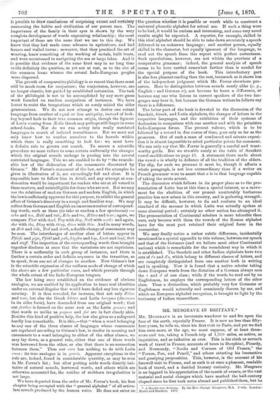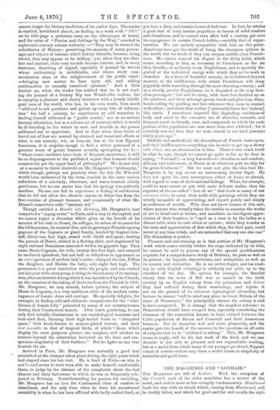MR. MUSGRA.VE IN BRITTANY.*
Ma. MUSGRAVE is an inveterate wanderer to and fro upon the face of the earth, especially France. It is now no less than fifty- four years, he tells us, since his first visit to Paris, and yet we find him once more, at the age, we must suppose, of at least three- score and ten, taking a French trip of 1,500 miles, as active, as inquisitive, and as talkative as ever. This is his sixth or seventh work of travel in France, accounts of tours in Dauphin6, Picardy, and Normandy, "Nooks and Corners of Old France," the " Parson, Pen, and Pencil," and others attesting his locomotive and gossiping propensities. This, however, is the account of his farewell visit to France, and as such is at once a pleasant, readable book of travel, and a decided literary curiosity. Mr. Musgrave is no laggard in his appreciation of the march of events, or the vast material and social changes which have marked the half-century elapsed since he first took notes abroad and published them, but he A Ramble into Brittany. By the Rev. George Musgrave, M.A. 2 vols. London Hurst and Blackett. 1870.
cannot forget the literary traditions of his earlier days. The reader is startled, bewildered almost, on finding in a work with " 1870 " on its title-page a prefatory essay on the advantages of travel, and the value of "Diaries and Jottings by the Way," couched in eighteenth-century solemn verbosity :—" They may be termed the subsidiaries of History ; preserving the memory of many person- ages and objects of interest which histary discards, because, being trivial, they may appear to be trifling ; yet, when they are obso- lete and ancient, these very records become curious, and, in many instances, deserving of regard, especially if penned by writers whose authenticity is indubitable, and whose every com- munication aims at the enlightenment of the public mind ; —bringing new matter to bear upon old, and adding -confirmation to recently conceived opinions." And a little further on, when the reader has realized that he is not read- ing the journal of a literary Rip van Winkle-like recluse, but is enjoying a pleasant and chatty interview with a keenly intelli- gent man of the world, who has, in his own words, been much "addicted to ask questions and gather up stray bits of informa- tion" for half a century, be experiences an odd sensation in finding himself addressed as "gentle reader," not as an archaic literary affectation, but as a solemn act of courtesy which it would be ill-breeding in the writer to omit and boorish in the person addressed not to appreciate. And in days when three books of travel out of four are marred by strained and unnatural efforts at what is not comedy, wit, or humour, but at the best flippant funniness, it is singular enough to find a writer possessed of a genuine sense of genial humour actually apologizing for it,— " where comic incidents have been of frequent occurrence, it will be no disparagement to the published report that humour should -occasionally get the upper hand of philosophy I" We do not wish or a moment to throw discredit on Mr. Musgrave's "philosophy," which though, perhaps not precisely what the late Dr. Whewell would have understood by the term, consists in the more serious reflections of a scholarly, observant, and warm-hearted elderly gentleman, but we can assure him that his apology was perfectly needless. No one can fail to experience a feeling of satisfaction that he did not allow the obsolete canons to debar him from the free exercise of pleasant humour, and occasionally of what Mr. Disraeli somewhere calls "lambent wit."
Though entitled a Ramble into Brittany, Mr. Musgrave's tour -comprised a "zigzag route" to Paris, and a stay in the capital, and we cannot regret a diversion which gives us the benefit of his account of his visit to Douai, its colleges, its mines of treasures for the bibliomaniac, its musical fete, and its grotesque Flemish-sprung pageant of the Gayants or giant family, headed by Gayant thirty-one feet high, armed with shield and spear, bearing the pennon of Douai, attired in a flowing skirt, and engineered by sight stalwart Douaisiens concealed within his gigantic legs. Then same Marie Cagenon, his wife, twenty-five feet high, and arrayed in medimval splendour, but not half so ridiculous in appearance as an outrespecimen of modern lady's attire ; Jacquet the son, Fillion the Artughter, and Binbin the baby, only eight feet high. The procession is a great institution with the people, and was carried out list year with extra pomp, it being the bicentenary of its resump- tion, after an interval during which it was interdicted by-the Church, on the occasion of the taking of the town from the Flemish in HO. Mr. Musgrave, we may remark, before quitting the subject of Marie de Cagenon, is a very malicious critic of the modern extra- vagances of female dress and carriage. He specially delights, for example, in finding odd and elaborate comparisons for the "exhi- bitions of female folly" presented by many of our countrywomen -during their Continental travels. After much pondering, he can only find suitable illustrations in our ornithological museums and iron-clad fleet, likening their high-heeled boots to "elongated spurs," their head-dresses to armour-plated turrets, and their Lout ensemble to that of tropical birds, of which "those which display the most gorgeous plumes are songless, and awaken no interest beyond the admiration bestowed on the hues and con- spicuous singularity of their feathers." But he fights as one that beateth the air.
Arrived in Paris, Mr. Musgrave was naturally a good deal astonished at the changes taken place during the eight years which bad elapsed since his last visit. He is fond of Paris—as who is not ?—and seems to have been able to make himself comfortable there, to judge by the absence of the complaints about the bad dinners and dirty bed-rooms to which he was so frequently sub- jected in Brittany. Notwithstanding his passion for travelling, Mr. Musgrave has no love for Continental ideas of comfort or cleanliness, and the only time when he loses his accustomed amiability is when he has been afflicted with badly cooked food, or put into a dirty and vermin-haunted bedroom. In fact, he retains a good deal of truly insular prejudices in favour of solid comfort and cleanliness, and he cannot even after half a century get over his repugnance to certain French habits,—notably that of expec- toration. We can entirely sympathize with him on this point. Americans have got the credit of being the champion spitters in the world, but we doubt if they can surpass middle-class French- men. He cannot conceal his disgust at the filthy habit, which seems, according to him, as necessary to Frenchmen as the air they breathe, or as liberty to an Englishman, and is specially dis- gusted at the redoubled energy with which they set to work in churches. As a lover of beautiful scenery, he is irritated beyond measure at the indifference with which Frenchmen will sleep piggishly while travelling through the most charming country ; and as a cleanly, precise Englishman, he is disgusted at the way first- class passengers "loll and lie along, with their feet doubled up on the cushions, and their unkempt greasy heads and gloveless, dirty, hands soiling the padding and lace wherever they come in contact with either ; and there they recline [i procumbit humi boa' fashion] like cattle. I sometimes imputed this degrading conditionsof body and mind to the excessive use of absinthe, vermuth, and frequent resort to brandy, ruin, and compounds to which the male portion of the population are now more than ever addicted ; for it certainly was not thus that we were mated in our land journeys thirty years ago."
Orderly and methodical, the slovenliness of French innkeepers, and their indifference to everything else in order to get up a showy table (thole, are an abomination to him. There is too much truth in what he says, though we cannot go quite so far as he does in saying, "Farewell l—a long farewell—to cleanliness and comfort, delicacy and refinement, at Dover or at whatever port we ship for the great Continent !" But we must not give the idea that Mr. Musgrave is by any means an unreasoning insular bigot. He does not spare his own countrymen, either at home or abroad, with regard to some of their national failings. What, for example, could be more severe or put with more delicate malice than his exposure of the so-called "love of art" that leads so many of our nouveaux riches to cover their walls with paintings which they are utterly incapable of appreciating, and regard purely and simply as evidences of wealth. Who does not know houses of this sort, where anyone who actually takes the trouble to examine the works of art in detail and at leisure, and manifests an intelligent appre- ciation of their beauties, is "eyed as a man is by the ladies at a dinner-table when he eats olives or caviare ; while they wonder at his taste and appreciation of that which they, for their part, could never at any time relish, and are astonished that any one else can!" The illustration is perfect.
Pleasant and entertaining as is that portion of Mr. Musgrave's work which comes strictly within the scope indicated by its title, he cannot be said to possess any of the special qualifications requisite for a comprehensive study of Brittany, its past AB well as its present ; its legends, superstitions, and antiquities, as well as its scenery and curiosities. He is no arclueologist, and his read- ing in early English ethnology is evidently not quite up to the standard of the day. He quotes, for example, the fanciful theory that the town of Dol was so named in the sixth century by an English colony from the privations and dolour they had suffered during their wanderings, and rejects it not on the ground of its inherent etymological absurdity, but because he cannot "call to mind any place in Great Britain of the name of Domnono.e," the principality whence the colony is said to have emigrated. It is strange that the manifest reference to Darunonium should- have escaped him, especially considering the closeness of the connection known to have existed between the Celtic population of Devon and Cornwall and their Armoricatt kinsmen. But he describes well and chats pleasantly, and the reader gets the benefit of the answers to the questions on all sorts of subjects that he is "addicted to asking." This, Mr. Musgrave seems to imply, will be his last work of the kind, and we can describe it not only as pleasant and not unprofitable reading, but as a model from which many of our younger go-ahead, flippant school of tourist-writers may learn a useful lesson in simplicity of narrative and good taste.































 Previous page
Previous page